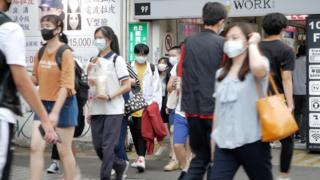Coronavirus: How Map Hacks And Buttocks Helped Taiwan Fight Covid-19

With direct flights to Wuhan and a population of 24 million people living in densely packed cities, Taiwan’s coronavirus outlook seemed grave.
But, to date, the disease has claimed just seven lives on the island, and it never went into full lockdown.
Its leaders credit masks as playing a key role, but not for the reasons you might suppose.
“Masks are something that, first, reminds you to wash your hands properly and, second, protects you from touching your mouth – that is the main benefit to the person who wears it,” explains Audrey Tang, Taiwan’s digital minister.
Taiwan’s citizens have worn face masks for health and other reasons since the 1950s, but the spread of coronavirus prompted a spate of panic-buying.
To even out demand, the masks had to be rationed while production was ramped up, from two million to 20 million items a day.
Long queues snaked back from pharmacies and other outlets – which posed a risk of contagion in themselves. So, the government decided data about each location’s stock levels should be made publicly available.
To do so, Ms Tang’s ministry launched a platform which each vendor could keep updated with their stock numbers.
Then, Taiwan’s hacking community, with whom the government had been building a strong relationship for years, stepped in.
It began drawing on the data, which had been made public, to build a series of real-time ‘mask maps’.
These provided residents with up-to-date information on where they could find masks close to their homes or work, with details of how many were available to buy.
Mutual trust
As the maps grew in popularity, more hacking teams joined in and added features like voice-control for users with visual impairments.
More than 10 million people have used the mask apps.
The result, says Ms Tang, is that these days only a minority do not wear them, and even they now “feel social pressure” to do so.
“This is the first time hackers have really felt that they are like the designers of civil engineering projects,” she adds.
“Because we trust the people a lot, sometimes the people trust back.”
The relationship between Taiwan’s authorities and the general population wasn’t always so smooth.
There were recriminations following 2003’s severe acute respiratory syndrome epidemic (Sars), when the response was “very chaotic”, says Ms Tang.
Part of the problem was that the government failed to create a centralised body to coordinate its response.
Leaders learned the lesson, and in 2004 established the National Health Command Centre to ensure that, in future crises, government agencies would work better together. They also ordered stockpiles of personal protective equipment (PPE) to be kept at a level that would be sufficient to deal with the early stage of any future pandemic.
In 2014, there was more civil strife when citizens stormed the parliament building to protest against a trade agreement which many felt brought Taiwan too close to China. Most of all they objected to how they hadn’t been listened to by those in power.
The event became known as the Sunflower Revolution because protesters used the flower as a symbol of hope.
Among their number were a band of civil hackers, who collaborated on programs that used available data to solve challenges facing society.
The government subsequently invited them to find ways to crowdsource and analyse citizens’ views and insights, to better influence the creation of new laws.
Ms Tang – herself a civic hacker at the time – suggests that Taiwan’s government was quick to counter the threat of the coronavirus, in part, because past crises had taught it the value of being more responsive.
So when a ‘netizen’ re-posted to Taiwan’s equivalent of Reddit a warning from Wuhan of a Sars-like illness, in the early hours at the end of December, people upvoted it – and the authorities paid attention.
That message turned out to be from Dr Li Wenliang, the Chinese whistleblower who first alerted the world to Covid-19.
Soon after, targeted sections of the population were tested and traced if they had just returned from Wuhan and recently experienced any health issues. It worked – and the virus was stopped in its tracks.
Meme v misinformation
There are other reasons why Taiwan has been able to suppress Covid-19.
Earlier this week, Chien-Jen Chen – the island’s former vice-president and a renowned epidemiologist – told British MPs that a well-designed contact tracing system and the application of strict quarantine rules to inbound visitors had also played a major role.
But he too said the nature of the island’s “hyper-democracy” – and the efforts its health chiefs had made to gain the public’s trust – were the key factors in it success.
Those in power aren’t just responsive to the voices of citizens, but also the memes and other messages they share.
It helped the government counter false claims that the material used to make masks was the same as that found in toilet paper. In response Taiwan’s Premier posted a self-mocking cartoon, which showed his bottom wiggling, alongside an explanation of the different sources that toilet paper and mask paper come from.
“It went absolutely viral” says Ms Tang, of the government strategy referred to as “humour over rumour”.
The strategy uses catchy tweet-length posts, which are designed to spread more quickly than misinformation.
“The chances are that most people will see… the clarification message before the rumour,” explains Ms Tang.
“Then they will have herd immunity – or, in the case of a meme, nerd immunity,” she jokes.
At a time when trust in the authorities is becoming frayed elsewhere, Ms Tang suggests Taiwan illustrates there is an alternative to a top-down approach, should a second wave of the virus hit.
But “that decision must be made by the entire society”, she adds.
READ MORE HERE
